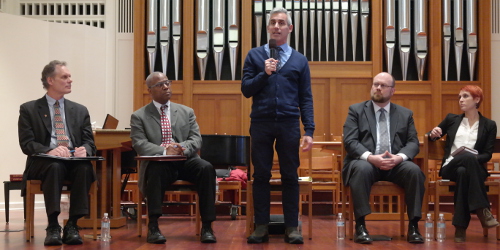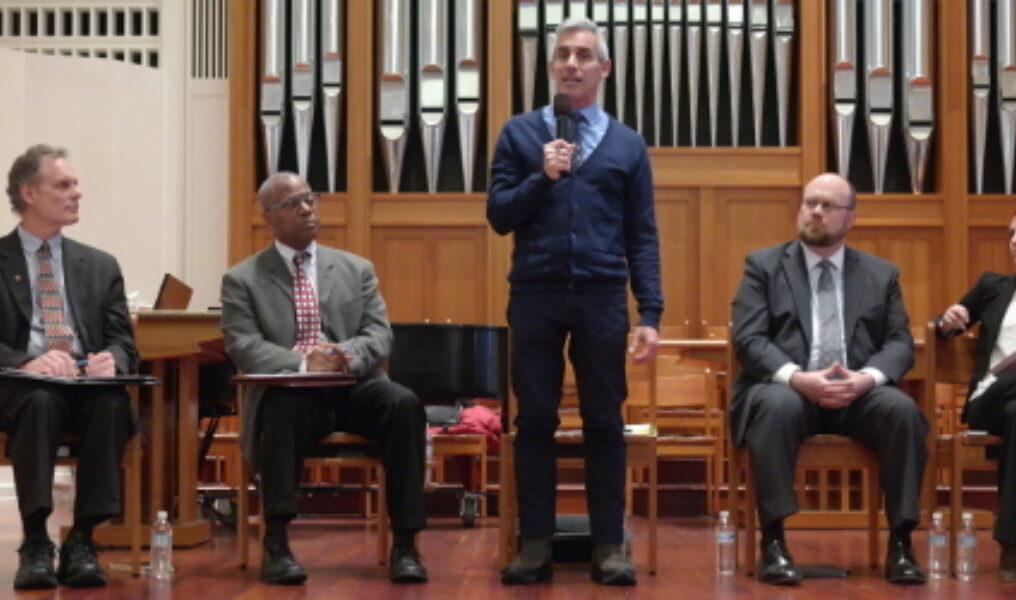BY AJ TRAGER

Michigan Round Table panelists (L-R) Rev. Dr. Campbell Lovett, Rev. Dr. Michael C.R. Nabors, Attorney Jay Kaplan, Rev. Dr. Stephen Butler Murray and Emily Dievendorf discuss the state of equality in Christian religious practice Nov. 20. BTL photo: AJ Trager
BIRMINGHAM – Organized by the Michigan Round Table, lead equality activists and top religious experts came together Nov. 20 to discuss the state of equality in religious circles and what the next stages are in the quest for a fully LGBT inclusive state.
Those gathered included Emily Dievendorf, executive director of Equality Michigan; Rev. Dr. Stephen Butler Murray, president of Ecumenical Theological Seminary Detroit; Jay Kaplan, ACLU staff attorney for the LGBT project; Rev. Dr. Michael C.R. Nabors, senior pastor at the New Calvary Baptist Church Detroit; and Rev. Dr. Campbell Lovett, conference minister at the Michigan Conference United Church of Christ.
They discussed how the Christian faith is changing and becoming more inclusive of LGBT individuals and how the Religious Freedom Restoration Act (RFRA) proposed in the Michigan legislature will harm residents. The conversation was moderated by David Crumm, a religious journalist and editor of Read the Spirit and former writer for the Detroit Free Press.
"The work of the Round Table is a place where we lift up full equality and full civil rights, but we also respect religious freedom and religious liberty. And this Elliott-Larsen Civil Rights act has brought both issues up against each other," said President and CEO of the Michigan Round Table, Steve Spreitzer, in his opening remarks.
Kaplan quickly moved the discussion along by stating the importance of adding sexual orientation and gender identity and expression to the state's civil rights act, including a special mention on the damages of RFRA and how it would allow individuals the right to discriminate based on their own personally held religious beliefs in non-religious incidences. An amendment has been proposed to amend the civil rights act to only include sexual orientation protections.
"Transgender is part of our community and you cannot say that you are serious about preventing discrimination and then single out a particular group for discriminatory treatment," Kaplan said. "A lot of times LGBT people are discriminated against because they do not always adhere to societal standards of acceptable gender representation."
Every citizen has held the right to openly practice their religion since the U.S. Constitution was ratified. It seems over 300 years later, some Americans are feeling threatened, worried that their rights will be infringed upon by being forced to provide services to LGBT individuals. But when you're in a public system, Kaplan explained, you are subject to more than just freedom of religion.
"When you decide of your own free will to enter into the realm of commerce, you are subject to a myriad of regulations and laws. When you open your building, you are subject to building codes; if you are making food, you are subject to health codes, and so on. You don't get a pass for any of those laws or regulations because you hold a particular individualized religious belief. You are certainly entitled to keep that belief, but it is not absolute that your religious belief may also be acted upon in non-religious settings."
If people say they have a deeply held religious belief, they would not have to follow the law with RFRA, Kaplan said. There have already been incidents of religious hospitals or members of the police force denying aid and services on RFRA grounds.
"The quickest way to play mischief in America is to claim that someone's religious freedom is in danger," Crumm said. "You're experiencing something tonight that is like a 500-year-later glimpse of the reformation as religion changes to become more inclusive to some groups that we have largely beat up on for far too many years."
Earlier this year in a response to 50 Detroit Baptist pastors coming out together against the LGBT community, Nabors said he was extremely offended these folks were speaking for all the Baptist community. He then "came out of the closet" to stand with the LGBT community and those practicing the Baptist belief.
"As a result of being silent, I began to have this clash of conscience that absolutely tore into my soul. I said, 'How can I be silent?' I thought about all of those fighters and clergy members who fought during the civil rights movement in the 50s and 60s, who had a hardcore wanting of transformation to take place but, because of their specific locale, they remained silent," Nabors said.
According to Murray, the Bible actually has very little mention of the LGBT experience, with Jesus himself saying absolutely nothing on the topic.
"Want to know how much of a priority it is for Jesus? He never brought it up. And if you look out through the entirety of the biblical witness, homosexuality is mentioned three, maybe four times. But how many times does Jesus talk about the poor? Jesus in the New Testament, in those four gospels, references the poor over 90 times," Murray said. "That is the focus of where social justice must go. We do not call for the discrimination of others, but we call for the righteousness of the society that looks to its least and seeks best to serve them."
"We (Baptists) are the originators of the fight for religious freedom, and let's remember what that fight is about. It is about the ability to practice one's own religion in freedom without worry of discrimination. It is not about imposing of one's own religious beliefs upon a society in which one lives. That determines that others who may or may not be of your religious tradition have to live life by scriptures of what you believe," Murray explained.
Tom Nelson, 85, and his wife Linda Karle-Nelson, 74, met at a PFLAG event as widowers. They married in 2007. They are both Catholic and work within their circles to promote change and acceptance of the LGBT experience.
"Culture in Michigan is changing; it is changing obviously nationwide," Tom Nelson said. "And I think the reason culture is changing is because of you folks. I want to thank you for what you do, particularly the pastors. Because it's a hierarchy in my Church that I have had to confront, educate and somehow change their viewpoint and still love them. That's hard. My church has changed in the past. I have hope."










